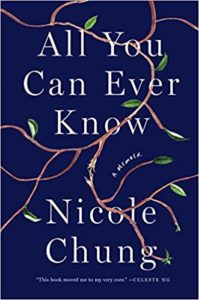All You Can Ever Know by Nicole Chung
Written by Ashley Kelmore, Posted in Reviews
Four Stars
Best for: Anyone interested in a beautifully written memoir that explores adoption, transracial adoption, race, and family.
In a nutshell: Author Nicole Chung was born to Korean parents in the US and adopted by a white couple. In this book, she explores what it meant to be one of the only Asian people around growing up, as well as how she connected with some of her birth family.
Worth quoting:
“People were not so simple; people could be and think and want many different things at once.”
Why I chose it:
I’ve seen so many people online raving about it.
Review:
This is a lovely book. When thinking about words that could describe it, I could also have gone with powerful, honest, or insightful. But I chose lovely because the writing is just that, as is the way the author handles complex and complicated issues.
Nicole Chung was born two months premature to parents who had moved to the US from Korea just five years prior to her birth. They already had one child together; they chose to place Ms. Chung up for adoption, but not through what we would probably think of as regular channels (i.e., an agency). Instead, someone working in the hospital knows the couple who would become Ms. Chung’s adoptive parents and alerts them to this possibility.
Ms. Chung is raised in the pacific northwest, in a part of Oregon with very few other Asian individuals. Her parents are always open about the fact of her adoption, but they don’t take steps to help Ms. Chung learn about her Korean heritage, and she doesn’t not pursue it independently much until she reaches college. Once she is married, she decides to see if she can get in touch with her birth family, motivated further when she learns that she may have a sister.
This book explores one story, and it is not claiming to be universal, but still, the issues it addresses can apply to so many of us, I think. There are obviously some specifics (e.g. the reality of transracial adoption) that may only be directly relatable to similarly situated individuals, but the overall concepts of belonging and family, about other possible life scenarios, about whether a choice was the best one (and if that is even the right question to ask), about how our families influence who we become, and even about nature vs. nurture, they all take up space here. I’ll be thinking about this one long after I pick up my next read.

